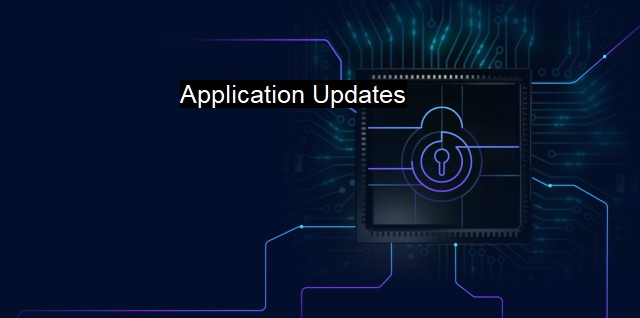What are Application Updates?
The Significance of Regular Application Updates in Cybersecurity: Enhancing Functionality, Reliability, and Protection Against Vulnerabilities and Exploits
"Application updates," refers to the process of releasing new versions, improvements, or enhancing existing features of a digital application. An application, or "app," is a sort of software designed to perform precise functions for the end user or another application. Example applications include email, calendar, and contact database programs, word processors, video editors, and music players.Application updates are key to keeping software applications running smoothly. They encompass a wide variety of tweaks, from minor bug fixes to major overhauls that pave the way for completely new user interfaces, experiences and functionalities. In some cases, updates can also serve to unveil new features in an application, further augmenting and enhancing its usefulness.
The practice of application updates is especially critical in the field of cybersecurity. Cybersecurity applications often need updates to stay aligned with the current techniques and strategies employed by cybercriminals. Innovative ways to infiltrate systems and pilfer data are continually being designed by cybercriminals. In these cases, updates essentially protect applications and their users from these new cyber threats.
When an update improves cybersecurity, it typically does so by patching points of vulnerability, bolstering built-in firewalls, introducing new security features, and adjusting to new community or government guidelines and policies. Fundamentally, these updates defend the application and offer users a safer, more secure online environment. Providing routine security updates reflects the cybersecurity industry's unwavering commitment to securing their users' data and digital presence.
Equally important is antivirus updates. Antivirus software is designed to detect, prevent, and remove malicious software, commonly called malware. These malware include viruses, worms, trojans, ransomware, and spyware, which are continuously evolving. Therefore, an antivirus program is as effective as its latest update. This underlines the crucial role that updates play in antivirus software.
Antivirus updates ensure the software's virus database or definitions are kept updated, facilitating efficient detection of novel threats. If the antivirus program's definitions are not regularly updated, it fails to recognize these new threats, leaving users extremely susceptible to cyber-attack.
Typically, an updated antivirus offers a defense line against zero-day vulnerabilities—these are undisclosed software imperfections that cyber-attackers can exploit before producers become cognizant of the problem or produce a fix. Zero-day exploit is a high-profile threat to individual as well as organizational cybersecurity because of the window of opportunity it offers cybercriminals to exploit weaknesses. Therefore, constant application updates that include antivirus updates both raise the sturdiness of cybersecurity barriers and fortify data privacy.
The irregular application and antivirus software updates cultivate an environment that welcomes cyber-attacks, giving cybercriminals the chance to target susceptible points within the application. By contrast, regular software updates make it difficult for attackers to predict the vulnerabilities they can exploit, making systems more secure and less prone to breaches.
The process of application updates, particularly represents an active defense mechanism against cyber threats. As much as it is important for developers to frequently update applications, it is equally vital for end users to routinely install these updates, ensuring a jointly reinforced front against the ever-growing and shifting landscape of cyber threats.

Application Updates FAQs
Why are application updates important for cybersecurity and antivirus software?
Regularly updating your cybersecurity and antivirus software ensures that your device is protected from the latest viruses, malware, and other cyber threats. As new threats emerge, software developers release updates that contain patches and fixes to vulnerabilities that hackers could exploit to gain unauthorized access to your device or data.How often should I update my cybersecurity and antivirus software?
It is recommended to update your software as soon as updates become available. Ideally, you should set your software to update automatically so that you don't miss any critical updates. If you have disabled automatic updates, check for updates manually at least once a week.What happens if I don't update my cybersecurity and antivirus software?
If you don't update your software, your device will be vulnerable to cyber threats that exploit known vulnerabilities. Hackers are constantly looking for ways to exploit unpatched vulnerabilities, and failing to update your software could leave your device, data, and personal information at risk.Can I skip certain application updates for my cybersecurity and antivirus software?
It is not recommended to skip any application updates for your cybersecurity and antivirus software. Even minor updates may contain important security patches and bug fixes. Skipping updates could leave your device vulnerable to cyber threats and compromise your cybersecurity.| | A | | | B | | | C | | | D | | | E | | | F | | | G | | | H | | | I | | | J | | | K | | | L | | | M | |
| | N | | | O | | | P | | | Q | | | R | | | S | | | T | | | U | | | V | | | W | | | X | | | Y | | | Z | |
| | 1 | | | 2 | | | 3 | | | 4 | | | 7 | | | 8 | | |||||||